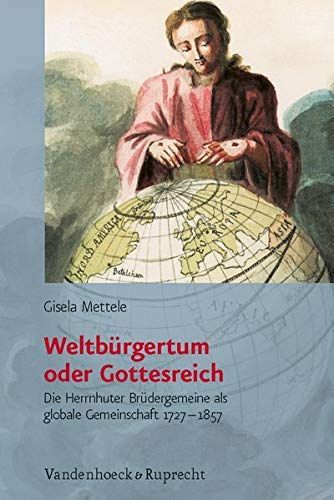
Weltbürgertum oder Gottesreich die Herrnhuter Brüdergemeine als globale Gemeinschaft 1727-1857
English summary: Using the example of the Moravian Church to examine the role that concepts of self and space play in creating a global community, Mettele traces the elaborate network of organization, communication, and collective memory that nurtured ties between settlements and missions spread around the globe. The Moravians understood themselves as a universal fellowship whose essential principle was that of the lifelong journey - a principle they applied both spiritually and literally. Soon after its foundation in 1727 in Saxony, the group organized extensive travel and missionary activities. They founded new settlements throughout Europe and North America, and set up mission stations in places as remote as Greenland, the West Indies, South Africa, and the Nicobar Islands. Moravians' sense of communal identity was sustained not only by close institutional links between distant settlements and the group's leadership in Saxony, but also by shared lifestyle, rituals and festivities, commonly read periodicals and devotional literature, and the regular circulation of reports from settlements and missions abroad. Over the course of the nineteenth century, the bonds linking the Moravian settlements nonetheless began to weaken despite technical advances in communication and transportation. Shifting identities and the development of rival (national) loyalties ultimately undermined the Moravians' determination to maintain their identity as members of a global community. German text. German description: Die Herrnhuter Brudergemeine entfaltete schon bald nach ihrer Grundung 1727 eine ausgedehnte Reise- und Missionstatigkeit. Herrnhuter Prediger wanderten durch ganz Europa und bauten ein Netz von Kontakten mit Freunden und Gleichgesinnten auf. Sie grundeten neue Siedlungen und errichteten zahlreiche Missionsstationen, auch in Ubersee. Enge organisatorische Bindungen hielten diese weltweite Gemeinschaft zusammen, unterstutzt durch einen regelhaften, gemeinsamen Lebensrhythmus und einen intensiven gegenseitigen Austausch. Die Prinzipien der Organisation, die Praktiken der Interaktion und Kommunikation innerhalb der Gemeinschaft untersucht Gisela Mettele in ihrer umfassenden Studie und richtet dabei ihren Blick auch auf das 19. Jahrhundert, in dem die globalen Bindungen der Brudergemeine schwacher wurden.